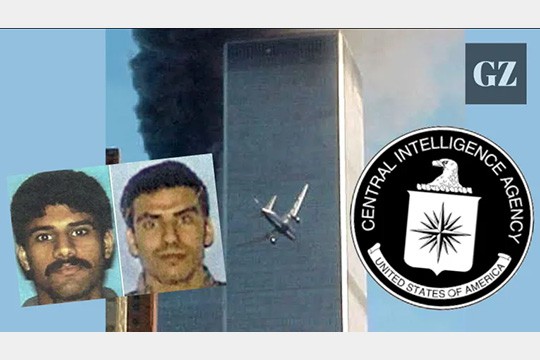At least two 9/11 hijackers had been recruited into a joint CIA-Saudi intelligence operation that was covered up at the highest level, according to an explosive new court filing, reveals Kit Klarenberg, an investigative journalist exploring the role of intelligence services in shaping politics and perceptions.
A newly-released court filing raises grave questions about the relationship between Alec Station, a CIA unit set up to track Al Qaeda chief Osama bin Laden and his associates, and two 9/11 hijackers leading up to the attacks, which was subject to a coverup at the highest levels of the FBI.
Obtained by SpyTalk, the filing is a 21-page declaration by Don Canestraro, a lead investigator for the Office of Military Commissions, the legal body overseeing the cases of 9/11 defendants. It summarizes classified government discovery disclosures, and private interviews he conducted with anonymous high-ranking CIA and FBI officials. Many agents who spoke to Canestraro headed up Operation Encore, the Bureau’s aborted, long-running probe into Saudi government connections to the 9/11 attack.
When originally released in 2021 on the Office’s public court docket, every part of the document was redacted except an “unclassified” marking. Given its explosive contents, it is not difficult to see why: as Canestraro’s investigation concluded, at least two 9/11 hijackers had been recruited either knowingly or unknowingly into a joint CIA-Saudi intelligence operation which may have gone awry.
In 1996, Alec Station was created under the watch of the CIA. The initiative was supposed to comprise a joint investigative effort with the FBI. However, FBI operatives assigned to the unit soon found they were prohibited from passing any information to the Bureau’s head office without the CIA’s authorization, and faced harsh penalties for doing so. Efforts to share information with the FBI’s equivalent unit – the I-49 squad based in New York – were repeatedly blocked.
In late 1999, with “the system blinking red” about an imminent large-scale Al Qaeda terror attack inside the US, the CIA and NSA were closely monitoring an “operational cadre” within an Al Qaeda cell that included the Saudi nationals Nawaf al-Hazmi and Khalid al-Mihdhar. The pair would purportedly go on to hijack American Airlines Flight 77, which crashed into the Pentagon on 9/11.
“[I said] ‘we’ve got to tell the Bureau about this. These guys clearly are bad… we’ve got to tell the FBI.’ And then [the CIA] said to me, ‘no, it’s not the FBI’s case, not the FBI’s jurisdiction’,” Mark Rossini, one of the FBI agents in question, has alleged. “If we had picked up the phone and called the Bureau, I would’ve been violating the law. I… would’ve been removed from the building that day. I would’ve had my clearances suspended, and I would be gone.”
The US intelligence community would have had every reason to shield Riyadh from scrutiny and consequences for its role in the 9/11 attacks, as it was then one of its closest allies.
No member of Alec Station has been punished in any way for the supposed “intelligence failures” that allowed 9/11 to go ahead. In fact, they have been rewarded. Richard Blee, the unit’s chief at the time of the attacks, and his successor Alfreda Frances Bikowsky, both joined the CIA’s operations division, and became highly influential figures in the so-called war on terror. Corsi, for her part, was promoted at the FBI, eventually rising to the rank of Deputy Assistant Director for Intelligence.
The public’s understanding of the 9/11 attacks is heavily informed by testimonies delivered by CIA torture victims under the most extreme duress imaginable. And Bikowsky, a veteran of the Alec Station that ran cover for at least two would-be 9/11 hijackers, had been in charge of interrogating the alleged perpetrators of the attacks.
The veteran FBI deep cover agent Aukai Collins concluded his memoir with a chilling reflection which was only reinforced by Don Canestraro’s bombshell declaration:
“I was very mistrustful about the fact that bin Laden’s name was mentioned literally hours after the attack… I became very skeptical about anything anybody said about what happened, or who did it. I thought back to when I was still working for them and we had the opportunity to enter Bin Laden’s camp. Something just hadn’t smelled right… To this day I’m unsure who was behind September 11, nor can I even guess… Someday the truth will reveal itself, and I have a feeling that people won’t like what they hear.”
read more in our Telegram-channel https://t.me/The_International_Affairs

 11:06 23.04.2023 •
11:06 23.04.2023 •























